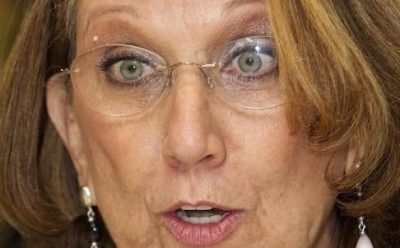
UNCTAD Secretary-General Rebeca Grynspan has issued a rallying call for 2024, in a statement claiming that the rich countries are using the green transition as an excuse to boost their own economies at the expense of developing ones. According to the UN’s trade chief, the world’s advanced economies are greenwashing to make their own eco-credentials look better, while preventing poorer countries from developing quickly.
Grynspan attacked the EU for taking Indonesia to the WTO over its restrictions on nickel exports and requirement to process the ore locally. She said Jakarta wanted to move up the value chain by making products from the nickel. It is only reasonable for a country with an overstretched electricity grid to want to use its own nickel tp produce its own batteries, fro example – rather than being forced to export to China or Canada.
UNCTAD Secretary-General Rebeca Grynspan has issued a rallying call for 2024, in a statement claiming that the rich countries are using the green transition as an excuse to boost their own economies at the expense of developing ones.
“They don’t want it to be exported in the raw form, but with value added. So they were taken to arbitration in the WTO. They lost in the first instance precisely because global trade rules have not been adjusted,” she said. She said that the Agreement on Trade-Related Investment Measures should be reformed. Jakarta has appealed but because the US has blocked the formation of a WTO appellate body, the case has stalled. The EU is considering taking enforcement actions such as tariffs on Indonesian goods. It makes for a “chaotic system” where richer, bigger countries have more power.
“Many trade rules forbid policies that can be used by developing countries. And the developed countries have more fiscal space to subsidise in the areas that are good for ‘quote, unquote’, the environment,” Grynspan, told the Financial Times in an interview.
She said the international trading system, which had allowed states such as South Korea and her native Costa Rica to progress, was no longer working for the poorest. “Trade and investment have been the two pillars for developing countries to really go on to a path of dynamic growth,” she said. But they now face two big problems, locked out of markets by the fast pace of technological change and facing new barriers erected in rich countries. “The least digitally prepared countries are falling farther behind in digital,” said Grynspan. “The other problem is that industrial policy …could affect developing countries’ ability to compete.”
The US landmark Inflation Reduction Act has $369bn of subsidies and tax breaks for domestically produced goods such as electric vehicles. The EU has responded in kind with increased subsidies and policies to stimulate production of silicon chips, critical minerals and green technology. “Developing countries see a lot of these policies as protectionist. They don’t have the fiscal space to go the path of subsidies, so they have to go the path of restrictions to trade or even duties or taxes,” she said.
She also attacked the EU’s new green rules banning imports from deforested land as too punitive. “If you only punish the population and don’t help them have a sustainable income from a sustainable forest . . . what is the way forward?” Brussels’s tax on imports of steel, cement and other carbon intensive products, the carbon border adjustment mechanism, was also iniquitous because it was based on developing countries paying the same carbon price as EU ones, she said. Under the Paris Agreement of 2015 to cut greenhouse gas emissions, countries that had historically emitted more agreed to bear a bigger burden of the costs than developing nations. “The whole issue of common but differentiated responsibility has been marginalised,” said Grynspan. “Paris is not a restaurant menu that you can choose from. That was an integral part of the deal.”
As head of Trade, Aid and Development, Grynspan is regarded by many at the UN as the guardian of the Sustainable Development Goals (SDGs) – 169 unachievable targets set by the UN – The sustainable development goals prioritise everything. In the real world, that is to prioritise nothing. The UN published a progress report in July, in which it warned that the SDGs were “in peril”, with a mere 15% of the SDG targets are on track and many are going in reverse.
Warning over world of debt
On 20 September, Grynspan spoke at the SDG Media Zone, where national leaders, influencers, activists, experts and media partners highlighted actions and solutions in support of the SDGs.
The session examined the ongoing crisis of global debt, which reached an all-time high of $92 trillion in 2022.
A recent UN report flagged that 37 out of 69 of the world’s poorest countries were either at high risk or already in debt distress, while highlighting the inherent inequality in the international financial system.
The report found that developing countries on average pay four to eight times more in interest rates than developed ones.
Disturbingly, 3.3 billion people live in countries that spend more on debt interest than education or health.
“They [developing countries] end up having not only a debt crisis, but a development crisis,” Ms. Grynspan said. “They are faced with impossible choices, to serve the debt or serve the people.”
Concrete steps needed to turn the tide
Turning to solutions, Secretary-General Grynspan outlined the “very concrete things” the world can do to rev up investment, debt restructuring, and liquidity and contingency funding for developing countries.
She echoed calls from UN chief António Guterres for an SDG Stimulus of at least $500 billion a year to bolster sustainable development and climate action.
“We’re proposing to scale up the multilateral development system finance for affordable, long-term finance for investment in [developing] countries,” Ms. Grynspan said.
“They can do that with re-capitalization of multilateral development banks, and a better use of the balance sheets.”
The UNCTAD chief also threw her support behind an effective debt-relief mechanism that supports payment suspensions, longer lending terms, and lower rates, as well as a deep reform of the global financial architecture.
Rallying support for developing countries
While in New York, Secretary-General Grynspan also had a range of high-level engagements to advocate for trade and development policies that support developing countries to tackle compounding and complex global crises emanating from climate change and the war in Ukraine in a post-COVID-19 world.
These included:
- Holding bilateral meetings with China, Costa Rica, Luxembourg, the European Union, Türkiye, Uganda and Venezuela, which focused on debt and finance.
- Representing the UN Secretariat in the SDG Summit Leaders Dialogue, where the High Impact Initiative on SDG Stimulus was launched.
- Moderating the high-level discussion of heads of state at the High-Level Dialogue on Financing for Development on mobilizing resources for sustainable development and addressing global economic challenges, especially debt.
- Presenting the report entitled “A world of debt: A growing burden to global prosperity”, which highlighted the crushing weight of debt on developing countries and the urgent need for debt sustainability.
- Participating at two events of the SDG Acceleration Day, namely UNCTAD’s event on Transforming4Trade, which seeks to help countries foster economy-wide productive capacities and achieve structural economic transformation, and another event on the SDG Stimulus alongside UNDP and the UN Department of Economic and Social Affairs.
- Representing UN Secretary-General António Guterres at events related to women for peace, as well as international financial architectural reform with European Council President Charles Michel, and Pedro Sanchez, the president of the Government of Spain.
- Participating in the ministerial roundtable on middle-income countries.
- Accompanying UN Secretary-General António Guterres in key bilateral meetings with heads of state.
Off-Grid Shop link ▶️ ??https://amzn.to/3to0cAQ ??https://bit.ly/3RsONrp
2. How to live legally in a field in Wales for under £17,000
 This book (cost £14.99) unveils the authors’ journey to create a self-sufficient haven. You get a complete blueprint on how to gain planning permssion for a field ythat could cost as ltitle as £5000. Get inspired by their battles for planning permission, self-built homes, solar power, composting loo, and rainwater harvesting. A must-read for dreamers wanting a simple, sustainable life. Shop link▶️ https://off-grid.net/shop/
This book (cost £14.99) unveils the authors’ journey to create a self-sufficient haven. You get a complete blueprint on how to gain planning permssion for a field ythat could cost as ltitle as £5000. Get inspired by their battles for planning permission, self-built homes, solar power, composting loo, and rainwater harvesting. A must-read for dreamers wanting a simple, sustainable life. Shop link▶️ https://off-grid.net/shop/
3. Your own Off-Grid Wi-Fi cinema – point at any flat surface
 This portable projector is designed for convenient display from your phone – a compact size and with multiple connectivity options. With its ability to project images and videos without the need for a direct power source, it’s suitable for off-grid scenarios. Perfect for movie nights or presentations in remote locations, the ELEPHAS Mini Projector enhances the off-grid experience with its versatility. Shop link▶️ ??https://bit.ly/3TwntuX ??https://bit.ly/41sFgp4
This portable projector is designed for convenient display from your phone – a compact size and with multiple connectivity options. With its ability to project images and videos without the need for a direct power source, it’s suitable for off-grid scenarios. Perfect for movie nights or presentations in remote locations, the ELEPHAS Mini Projector enhances the off-grid experience with its versatility. Shop link▶️ ??https://bit.ly/3TwntuX ??https://bit.ly/41sFgp4
4. Foldable Chair
 ALPHA CAMP Camping Folding Chair is an excellent choice for off-grid living. This oversized, comfy saucer chair offers plush comfort and portability, making it perfect for camping, gardens, and fishing. With a robust 160kg weight capacity and a portable carry bag, it’s both sturdy and convenient. This chair enhances off-grid experiences, providing a comfortable and relaxing seating solution for outdoor activities. Shop link▶️ ??https://bit.ly/47YzQo6 ??https://bit.ly/41rZMWQ
ALPHA CAMP Camping Folding Chair is an excellent choice for off-grid living. This oversized, comfy saucer chair offers plush comfort and portability, making it perfect for camping, gardens, and fishing. With a robust 160kg weight capacity and a portable carry bag, it’s both sturdy and convenient. This chair enhances off-grid experiences, providing a comfortable and relaxing seating solution for outdoor activities. Shop link▶️ ??https://bit.ly/47YzQo6 ??https://bit.ly/41rZMWQ

